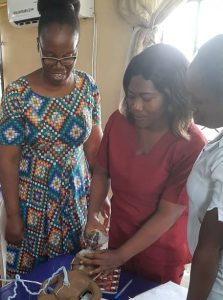MMM Four Mile Hospital – Uses Funding to Save Lives and Make Major Improvements
By Sr. Charity Munonye
Located in Ebonyi State, southeast Nigeria, St. Patrick Hospital also known as Mile Four, was established in 1946 and managed by the MMM. It was founded to detect, treat and eradicate Hansen’s disease also known as Leprosy. The Hospital serves severely low-income people with high levels of illiteracy. The area has also seen an increase in insurgency and many IDPs (internally displaced people) live amongst the community due to camps being attacked. The combination of poverty, illiteracy, political unrest and the remoteness of the area make health a life-challenging issue for the local children and adults who struggle with a complete lack of resources.
There is a maternity unit in the hospital that was established in 1966 and today includes 70 maternity beds, 32 Paediatric beds and 20 nursery cots. It is a specialist referral centre for many child and mother issues. There are also outreach services and mobile clinics run from the hospital providing a wide range of preventative, palliative care, education, health, hygiene and gender/safeguarding issues. The people in the area face major challenges to health and the services provided seek to help the people learn how to improve their quality of life on several different fronts that they would otherwise not experience.
Due to preventative health programmes and health services, the area is seeing outstanding improvements in many aspects of well-being. Our good news includes a major decrease in infant mortality rates. Improved equipment purchased with the funding of Misean Cara (MC) and the increase in community health training programmes means that people can be treated locally and not sent off to far distances. There have been many challenges in the hospital that are being overcome in a positive way due to the increase in funding and training. All of this allows us to create an increased quality of life in the community for school children, expectant and new mothers through a wide variety of additional resources.
The Hospital recently underwent a review for funding that identified several major improvements on key markers for health in the community. This shows exciting progress. Now that we go to more schools, our networking with different school authorities is increasing and they appreciate our services. Our active collaboration with the Ministry of Health includes provision of vaccines, training, and monitoring of our services against set standards, retraining of our professional staff to cope with modern trends and data validation. Our staff training has empowered our employees to save more lives and to help more people in need.
